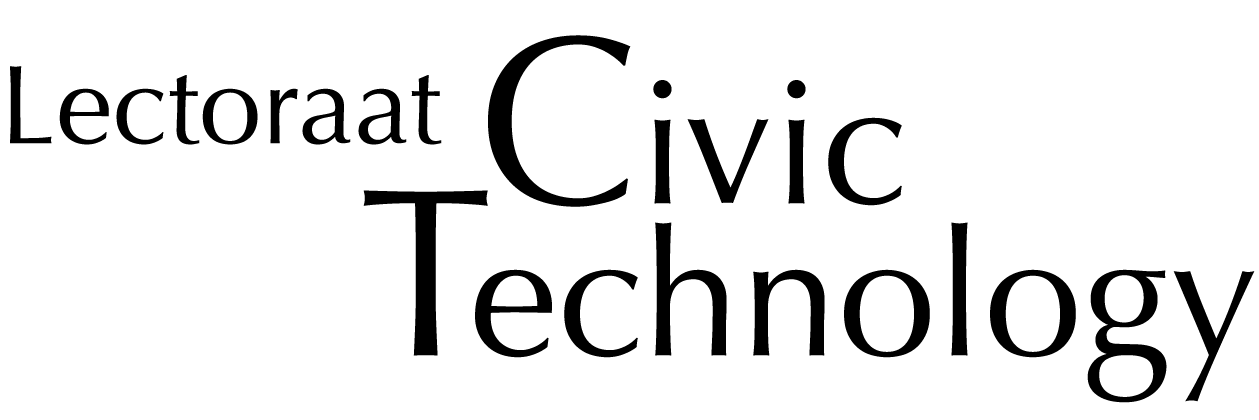This pages shows a selection of current and past projects from the research group Civic Technology and the UrbanUX research lab, where students from The Hague University of Applied Sciences collaborate with us.
Pre-PhD project: Designing accessible data visualisations using cross-modal metaphors
Data visualisations are vital to interpret data, but conventional ones require training to interpret, resulting in unequal accessibility. This project addresses this accessibility gap by investigating how cross-modally congruent design enables data visualisation metaphors that intuitively convey meaning. The outcomes include novel forms of data visualisation and validated design frameworks.
Talking Lamp-posts
In the near future, lamp-posts – and other objects in public spaces – will be joining the internet of things, just like many objects in our homes have done already. Beyond the task of bringing light to the street, lamp-posts will also gain capabilities to sense and detect presence, movement, temperature, humidity, sound.
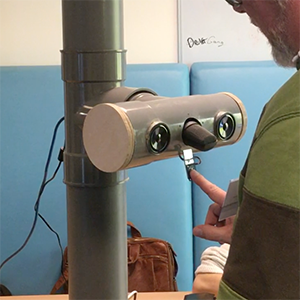
In this project, we explore the potential of conversational speech interfaces for artificial intelligence in public spaces: what if you could talk with a lamp-post that is connected to its surroundings, that collects super-local information, is part of a network, and can form a link to the municipality?
Our research will provide insights into how to design experiences with such talking lamp-posts that people appreciate. Factors we have determined to be of influence are, e.g., the lamp-post’s location, its identity, its tone of voice, the topic and the usefulness of its local knowledge.
The project delivers a series of prototypes, ranging from simulations to a fully functional talking lamp-post that is tested in city neighbourhoods.
Public Dialogues #goodtalk
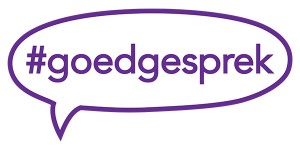
Changes in society invariably lead to feelings of discomfort, tensions and social unrest, also in our present time. Media, and social media in particular, quickly and effectively make such feelings publicly visible and therefore have a magnifying effect on the sentiments in society: tweeting your opinion is a piece of cake, just like reacting to opinions, but a dialogue will not easily get started and polarisation is imminent. In this project we address this problem as a design challenge.
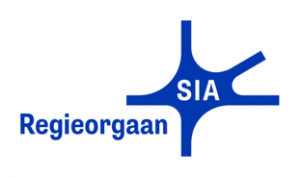
The project has a duration of two years, starts April 1, 2019, and is co-funded with a research grant from SIA (RAAK-Publiek). The project team consists of ca. 30 professionals from the participating organisations, a mix of researchers, designers, and professionals in the involved metropolitan neighbourhoods.
read more…Artificial Intelligence in Public Spaces
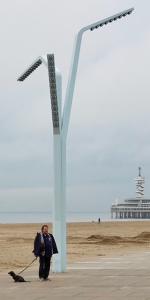
Artificial Intelligence is not a hype. After a slow start in the 20th century, we now see more and more applications of AI, particularly indoors (robot vacuum cleaners, smart installations for climate control) and our personal space (bio-sensors). In the outdoor space, AI is seen much less often, but the technical infrastructure is developing rapidly and new possibilities emerge. We investigated which innovations can be realised with AI in the public outdoor environment.

The project was made possible with a KIEM-subsidy from Regieorgaan SIA.
In this research project, we collaborated with Smart The Hague and a number of creative entrepreneurs in The Hague. The project ran from Nov. 1, 2017 until Oct. 31, 2018. It delivered many insights and two prototypes, and was flanked by numerous student projects that yielded both research results and design concepts. In Dutch, you can read all about it the final report of the project.
read more…Virtual Reality for citizen participation in urban development
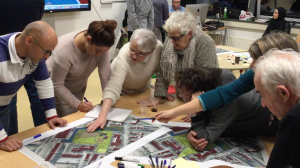
In the Mariahoeve neighbourhood of The Hague, a park is being revamped. The neighbourhood manager, as representative of the municipality, invited inhabitants to design three variants for the park, with the aid of specialists and using 3D modelling tools. The three designs were then presented to all neighbourhood inhabitants, using Virtual Reality, who voted for their preferred design. Three forms of VR were utilised and evaluated in this research project.
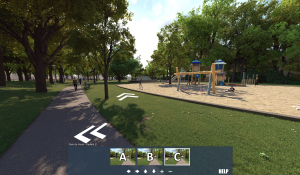
In this project, we closely collaborated with the officials of the district Haagse Hout and with the urban development department of the municipality of The Hague. The 3D models and the VR environment were created by, respectively, Plan34 and Skeye.
read more…Creating Awareness in Motorists about Emission Consequences
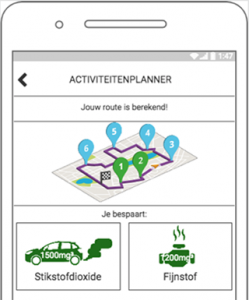
How do we make motorists more aware of the consequences of vehicle emission? Naming and shaming, or empowerment to change? This project aimed to find the best approach for individual needs.
Personal data is increasingly used by cities to track the behavior of their inhabitants. While the data is often used to mainly provide information to the authorities, it can also be harnessed for providing information to the citizens in real-time. In this project, we aimed to increase the awareness of motorists about the environmental consequences of their driving behaviour.
This project was the BSc graduation project of Ismaël Harraou.
read more…Street Speed Trap
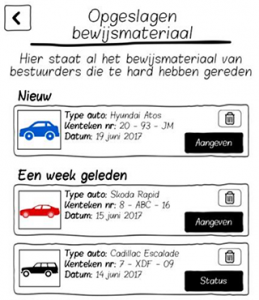
In many neighbourhoods, inhabitants are disturbed by speeding traffic in their street. Often one feels powerless because no action can be taken. There is no evidence and often we do not know who was speeding. Can we use technology to allow the inhabitants to measure the speed of passing traffic? If so, what will they do with this information? Share it amongst each other, or with the police? This project addressed both the technical challenge and the social impact. We collaborated with local creative industry in this project.
Prototypes created by Annemarie Vermaesen and Felix Cuellar.
Social Media Restructured
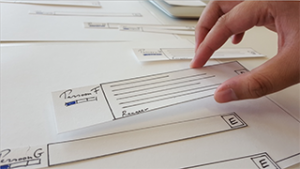
Current social media are designed around timelines: they present discussion in chronological order only. This project aimed to design alternative ways to present posts on social media that can improve the quality of discussions.
In online social media, it is rare to see a collective forming of an opinion, or an exploration and deeper exchange of different opinions. So how can such social media contribute to collective learning in a community?
Prototypes were created by Huy Trinh and Diko van der Meer.
read more…Slow Mail
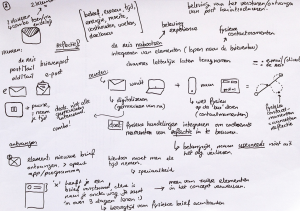
With the introduction of email, sending messages and letters has nog only become easier, but also faster. In general, we experience this as an optimisation and improvement of the physical letters we used to send. yet, sending mail on paper, in an envelope, certainly had its charm that we rarely experience any longer. This project is a search for new forms of communication that function with modern technology but retain the type of charm that hand-written paper post possessed. It appears to be difficult to let go of existing metaphors and known forms of interaction.
A concept for a modern slow mail service was created by Tim Davids.
Embedded Park Easy
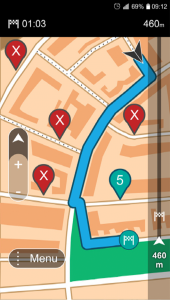
Finding a parking garage is easy with today’s car navigation systems, but finding a parking lot in the street is a challenge. This project explores the required technology and the optimal interface design for a mobile app that helps you find a free spot to park.
In collaboration with local creative industry, prototypes were created by Brinsley Ramtahalsing, Kevin Netteb, and Sinthujan Jeyakumar.
read more…Smart Spui, The Hague
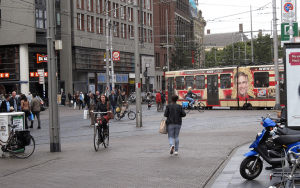
The main crossing in the centre of The Hague is characterised by a lack of traffic rules, with public transport, taxis and bikes passing through the crowd of pedestrians. This project took a leap forward and conceptualised how autonomous public transport, without drivers, can communicate its intentions to pedestrians.
A prototype was conceptualised and visualised by Elize de Kuijper.
read more…Message on the Spot
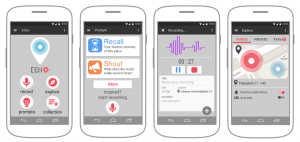
Current technology offers opportunities to deploy location-awareness in mobile apps. This project explored a range of design concepts for services that aim to bring people together in novel ways, using location-awareness and cultural content to foster serendipity and chance encounters.
Prototypes were created by Jim Bemelmans, Brent Rundberg, and Pitnaree Krachangwong.
read more…Citizen-Pro
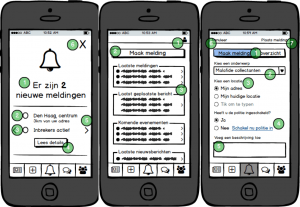
The app designed in this project allows citizens to map such issues, ranging from social incidents to required maintenance and desired changes. Both professionals and citizens can benefit from becoming aware of the issues at stake in a neighbourhood and discussing them publicly.
Prototypes were created by: Danique Valstar, Jeroen Diks, Mia Henkels, Boy Versteeg, Daniel Ramirez Torres, Gino Aldewereld, and Hamoen Ghafelehbashi.
read more…Your Own Neighbourhood
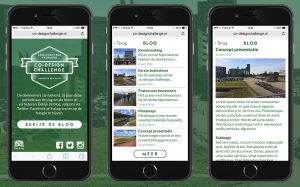
How can citizens be motivated to be more engaged and participate in developments of the public areas in their neighbourhood? This project created new service concepts for the municipality of The Hague to approach citizens that usually do not participate, in a motivating way.
Service prototypes created by Roel van Adrichem, Jeroen Dijkstra, Andrew Lekahena, Brent Rundberg, Gino Aldewereld, Romy Koch, Samira El Messaoudi, Ananta Mulyono, Rick van den Broek, Tim Davids, Arjan Elschot, Ismaël Harraou, Gerhard Kraaijenoord, Suzanne van den Berg, Dominique Chalabalaki, Raisa de Koning, Nadesh Ligthart, Jim Bemelmans, Texas de Bruin, Kelly Ferwerda, Boas van Olden, Tessa Guijt, Diko van der Meer, Huy Trinh, Ria Verleg, Tilly Brito, Midge Hazewinkel, Norvin Mercelina, Adjay Ramkhelawan, Arjen Holleman, Justin Hundman, David de Jonge, and Boy de Wit.
Interactive Technology in the Social Life of Elderly
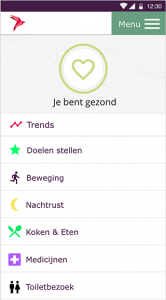
Elderly are often physically challenged and as a result socially limited. This project explored the social needs of elderly, e.g. in fighting loneliness, and the design requirements this imposes on communication tools that could support and alleviate them and their social circle.
Concepts developed by Hussein Houssein, Ferdi Mac Gillavry, Bas Hellings, Dennis Weijsenfeld, Cor Hortensius, Karin Valstar, Frans Huigen, Justin van der Vlies, Daniëlle Aartsen, and Joris Giesbers.
Services and prototypes created by Minji Jung, Sarah Lopez Chavarria, Margot Mollerus, Sybren Burghout, Siyun Hwang, Ue Jun Kim, Casper Piket, Nahwin Chedoe, Jerry Koers, and Faisal Moulay Ahmed.
Services in Mariahoeve
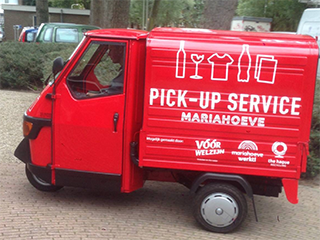
The Mariahoeve district of The Hague requested the design of a new set of services to stimulate employment and increase social inclusion in its neighbourhood. In this project, students and researchers worked together with practitioners to conceptualise new services: Mariahoeve Storytelling Platform and Mariahoeve Pick-up Service. The latter service was conceptualised, implemented, and put in practice by Leonie Flin.
Development Aid Insights
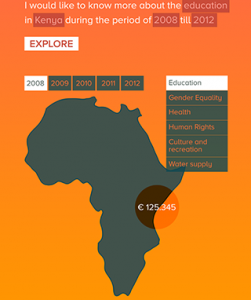
The Ministry of Foreign Affairs aims to publish financial data from IATI on aid programmes in correlation to data from the World Bank, to give insight into indicators of development (e.g. birth rates, death rates, epidemic spread, etc.) and therefore into the effectiveness of the aid programmes. This project explored the possible interfaces for an online platform for the support of policymakers, aid organisations, journalists, and politicians.
The concept displayed was created by Andre Beyer, Bilal Hussain, Eric van der Zwan, Sarah de Jager, and Siyana Ivanova.
Special Welfare Online
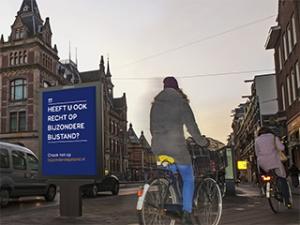
Applying for special welfare is often hard. Not just because it is difficult emotionally, but also because the process is cumbersome. This project, in collaboration with Centric, aimed to redesign that process and create better online solutions, to lower the thresholds.
The service design displayed here was conceptualised by Rogelio Nedd, Pim Steketee, and Claudia Aio.
Lost and Found
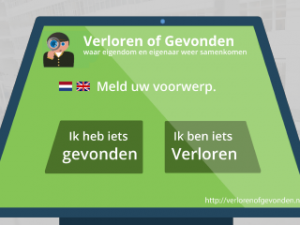
The municipality of The Hague commissioned this project to design a new online platform to reunite citizens with their lost properties that have been found, but are not yet retrieved. The new platform aims to reduce costs of storage and communication.
Concept by Dave Verloop, Laxmi Manna, Holthing Chung, and Kylian Rang.
